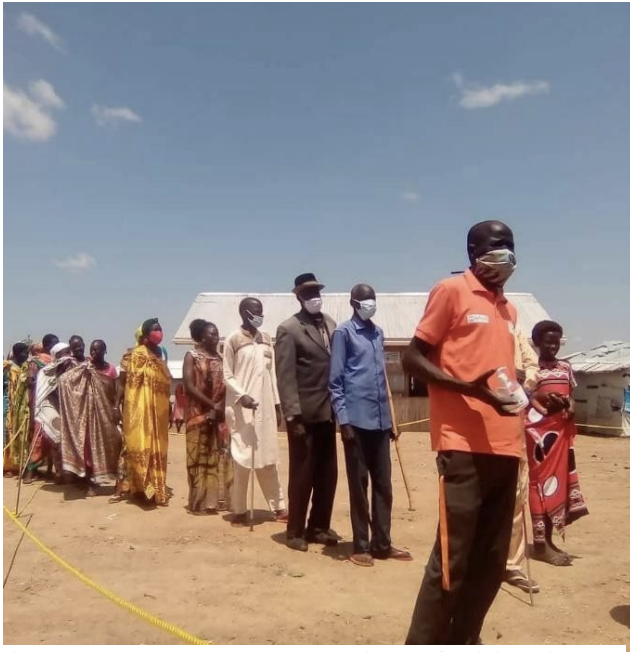Food Distribution with Safety and Dignity
Protection Mainstreaming for Effective Humanitarian Emergency Response

Due to the COVID-19 pandemic, Nonviolent Peaceforce implemented a project to prevent COVID-19 related violence in densely populated urban areas of Juba, as well as enhance multi-cluster partner’s COVID-19 community response from a Centrality of Protection approach. In order to achieve this goal, NP worked together with partners, authorities and local peace infrastructure to ensure that members of the communities had safe access to services during the pandemic.
Mangateen is a highly congested and densely populated Internally Displaced Persons (IDP) Camp in Juba. Overcrowding, poor sheltering, scarce resources and limited access to reliable information amidst others were already serious threats for the increasing protection concerns during the COVID-19 pandemic. The impact of COVID-19 is not only limited to a health crisis but also a protection crisis for the most vulnerable populations in countries like South Sudan.
Aiming to enhance the emergency humanitarian response and promote the delivery of humanitarian assistance following its principle of "Do no harm," NP conducted protection mainstreaming trainings for the humanitarian agencies operating in Mangateen IDP Camp in Juba and its community leadership structures to address challenges in the area. During NP’s protection mainstreaming training session in Mangateen, Angelina, a Community Leader in Mangateen IDP camp, attributed the lack of organization and violence during distribution activities to the lack of coordination between agencies and community leadership on site and explained:
“I get surprised when I see organizations coming here giving out items and going back without talking to us the community leaders but these are our people, we know them, we stay with them and we know how to talk to them. That is why you see people scrambling and fighting because they are not sure whether they will get what is being given and they don’t know where to go if you don’t get it.” - Angelina, Community Leader, Mangaten IDP Camp
NP identified protection concerns during the distribution when people engage in fights and there is poor crowd control, making it a hostile environment for vulnerable groups such as the people with disabilities, elders, and lactating mothers as their safe access to distribution of humanitarian aid is obstructed. Furthermore, there were coordination challenges between agencies operating in the IDP camp, community leaders, and community structures during distributions which provoked misunderstandings between community members and increased tensions. In November 2020, NP conducted two (2) protection mainstreaming trainings for 91 individuals, among them agencies’ staff, community leaders and members of the Community Task Force in Mangateen. Emphasizing community engagement and relationship-building in effective humanitarian emergency response, NP discussed the underlying key concepts of protection mainstreaming during aid distribution, highlighting its principle of ‘Do No Harm’, and seeking to ensure meaningful access and accountability to project participants, whilst looking a the role humanitarian actors play during distributions.
As a result of these trainings, existing partners started to involve community leaders in the planning and execution of distribution sessions in the project locations. Improvements during general food distribution that took place in Mangateen in November 2020 were identified whereby the distribution partner’s staff showed more respect and concern to the recipients of aid, with superior care towards people with special needs and effective and respectful crowd control which prevented violence during distribution sessions. In addressing the concerns of crowd control, NP facilitated meetings between humanitarians and authorities to plan the next distributions and to avoid any complications that would result in protection concerns. In addition, NP trained partners on relevancy of protective presence for crowd control during registrations and distributions and trained agencies on how to identify protection concerns during their activities. One participant stated:
“After the training, we decided to pick the [community] watch group to control the crowd from among the people trained by NP on protection mainstreaming in order to help us control the crowd, this month we got few complaints from the community instead they are appreciating our new method of food distribution, am really grateful for the training.” - James, Food Distribution Agency Staff
The inclusion of the community leaders during the distribution and in the post-general food distribution meeting was another improvement noticed by the NP team at the site. According to Angelina, who was previously disappointed with the lack of community’s involvement in activities in the camps, has expressed her happiness to NP for taking up the initiative to address the issue, according to her:
“[I] am very happy for the work NP is doing here, for the first time I was called for a meeting to plan food distribution in my camp and even after that I was called to find out if there is something we can do together to improve the food distribution next time, I feel important, I wish NP could take up the management of the camp to do more work with us.” - Angelina, Community Leader in Mangateen IDP camp.
As a result of protection mainstreaming trainings, coordination between community members and humanitarian agencies is enhanced, reducing complications during food distributions and increasing accountability and communication with local community, enhancing a protection environment for civilians.
